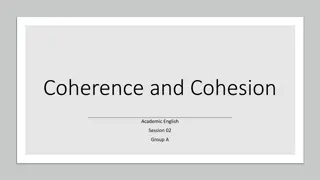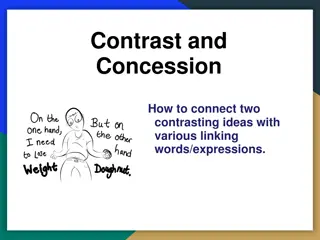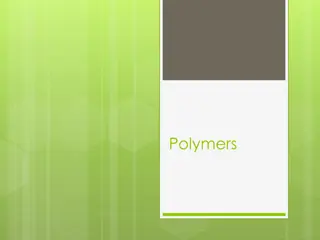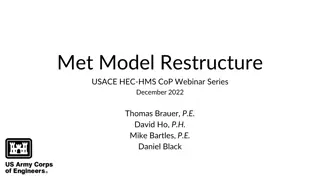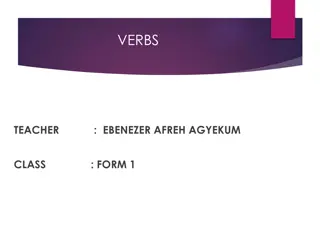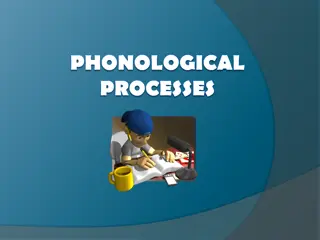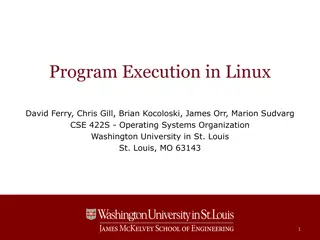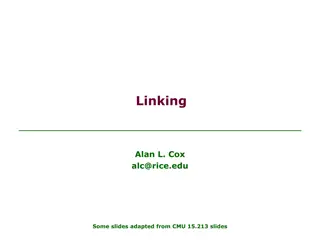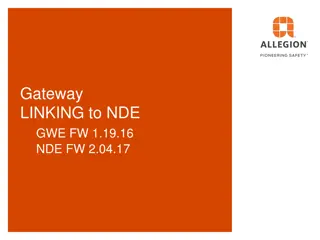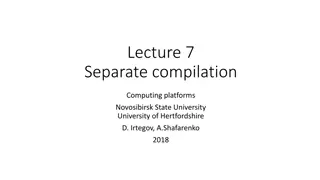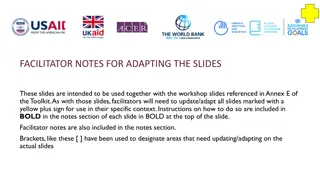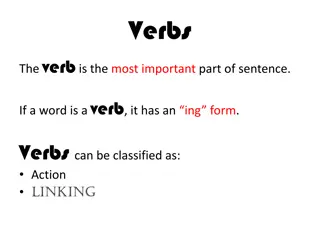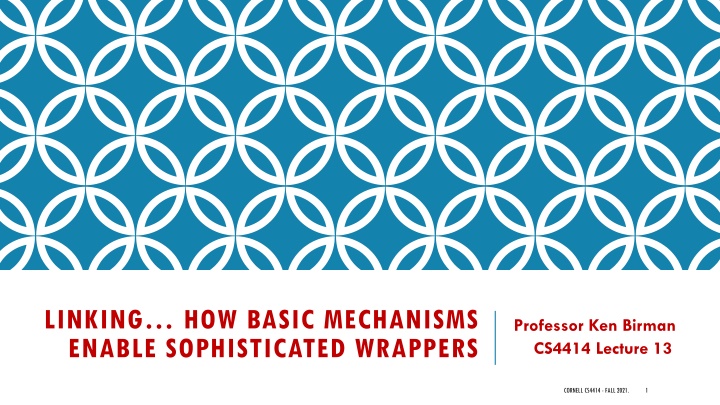
Unveiling Sophisticated Wrappers Through Basic Linking Mechanisms
Explore how basic mechanisms enable sophisticated wrappers in systems programming through dynamic linking, shared libraries, and method interpositioning techniques. Discover the control offered by linking in modifying existing APIs and enhancing program behavior.
Download Presentation

Please find below an Image/Link to download the presentation.
The content on the website is provided AS IS for your information and personal use only. It may not be sold, licensed, or shared on other websites without obtaining consent from the author. If you encounter any issues during the download, it is possible that the publisher has removed the file from their server.
You are allowed to download the files provided on this website for personal or commercial use, subject to the condition that they are used lawfully. All files are the property of their respective owners.
The content on the website is provided AS IS for your information and personal use only. It may not be sold, licensed, or shared on other websites without obtaining consent from the author.
E N D
Presentation Transcript
LINKING HOW BASIC MECHANISMS ENABLE SOPHISTICATED WRAPPERS Professor Ken Birman CS4414 Lecture 13 CORNELL CS4414 - FALL 2021. 1
SYSTEMS PROGRAMMING IS ABOUT TAKING CONTROL OVER EVERYTHING We have seen that a systems programmer learns to program the hardware, operating system and software, including the C++ compiler itself, which we program via templates. Today we will look at how linking works, and by doing so, we will discover another obscure example of a programmable feature that you might not normally expect to be able to control! CORNELL CS4414 - FALL 2021. 2
CORE SCENARIO We are given a system that has pre-implemented programs in it (compiled code plus libraries). But now we want to change the behavior of some existing API. Can it be done? CORNELL CS4414 - FALL 2021. 3
IDEA MAP FOR TODAY Libraries Dynamic linking: -shared -fPIC compilation. DLL segments, issue of base address Compiling to an object file Wrappers for method interpositioning: a super hacker technique! Static versus dynamic linking in Linux. Insane/weird part, introduces some amazing features Main part of lecture. Be sure to understand this. CORNELL CS4414 - FALL 2021. 4
Your code Std:xxx libraries LINKING + = Executable Statically linked object files Libraries your company created Compile time Runtime A linker takes a collection of object files and combines them into an object file. But this object file will still depend on libraries. Next it cross-references this single object file against libraries, resolving any references to methods or constants in those libraries. If everything needed has been found, it outputs an executable image. CORNELL CS4414 - FALL 2021. 5
EXAMPLE C PROGRAM (C++ IS THE SAME) int sum(int *a, int n); int sum(int *a, int n) { int i, s = 0; int array[2] = {1, 2}; int main(int argc, char** argv) { int val = sum(array, 2); return val; } for (i = 0; i < n; i++) { s += a[i]; } return s; } sum.c main.c CORNELL CS4414 - FALL 2021. 6
LINKING Gcc is really a compiler driver : It launches a series of sub-programs linux> gcc -Og -o prog main.c sum.c linux> ./prog main.c sum.c Source files Translators (cpp, cc1, as) Translators (cpp, cc1, as) Separately compiled relocatable object files main.o sum.o Linker (ld) Fully linked executable object file (contains code and data for all functions defined in main.c and sum.c) prog CORNELL CS4414 - FALL 2021. 7
WHY LINKERS? REASON 1: MODULARITY Program can be written as a collection of smaller source files, rather than one monolithic mass. But later we need to combine all of these. Each C++ class normally has its own hpp file (declares the type signatures of the methods and fields) and a separate cpp file (implements the class). For fancy templated classes, C++ itself creates the needed cpp files, one for each distinct type-parameters list. CORNELL CS4414 - FALL 2021. 8
AN OBJECT FILE IS AN INTERMEDIATE FORM An object file contains incomplete machine instructions, with locations that may still need to be filled in: Addresses of methods defined in other object files, or libraries Addresses of data and bss segments, in memory After linking, all the resolved addresses will have been inserted at those previously unresolved locations in the object file. CORNELL CS4414 - FALL 2021. 9
REASON 2: LIBRARIES Libraries aggregate common functions or classes. Static linking combines modules of a program, but also used to be the main way of linking to libraries: Executables include copies of any library modules they reference (but just those .o files, not others in the library) Executable is complete and self-sufficient. It should run on any machine with a compatible architecture. CORNELL CS4414 - FALL 2021. 10
REASON 2: LIBRARIES Dynamic linking is more common today Your executable program doesn t need to contain library code At execution, single copy of library code is shared, but the dynamic linker does need to be able to find the library file (a .so file) If a dynamically linked executable is launched on a machine that lacks the DLL, you will get an error message (usually, on startup, but there are some obscure cases where it happens later, when the DLL is needed) CORNELL CS4414 - FALL 2021. 11
HOW LINKING WORKS: SYMBOL RESOLUTION Programs define and reference symbols (global variables and functions): void swap() { } /* define symbol swap */ swap(); /* reference symbol swap */ int *xp = &x; /* define symbol xp, reference x */ Symbol definitions are stored in object file in the symbol table. Symbol table is an array of entries Each table entry includes name, type, size, and location of symbol. With C++ the location is the namespace that declared the class CORNELL CS4414 - FALL 2021. 12
THREE CASES A symbol can be defined by the object file. It can be undefined, in which case the linker is required to find the definition and link the object file to the definition. It can be multiply defined. This is normally an error but we will see one tricky way that it can be done, and even be useful! CORNELL CS4414 - FALL 2021. 13
SYMBOLS IN EXAMPLE C PROGRAM Definitions int sum(int *a, int n); int sum(int *a, int n) { int i, s = 0; int array[2] = {1, 2}; int main(int argc, char** argv) { int val = sum(array, 2); return val; } for (i = 0; i < n; i++) { s += a[i]; } return s; } sum.c main.c Reference CORNELL CS4414 - FALL 2021. 14
LINKERS CAN MOVE THINGS AROUND. WE CALL THIS RELOCATION A linker merges code and data sections into single sections As part of this it relocates symbols from their relative locations in the .o files to their final absolute memory locations in the executable. It updates references to these symbols to reflect their new positions. CORNELL CS4414 - FALL 2021. 15
OBJECT FILE FORMAT (ELF) 0 ELF header Segment header table (required for executables) Elf header Word size, byte ordering, file type (.o, exec, .so), machine type, etc. Segment header table Page size, virtual address memory segments + sizes. .text section (code) .rodata section (read-only data, jump offsets, strings) .data section (initialized global variables) .bss section (name bss is lost in history) Global variables that weren t initialized: zeros. Has section header but occupies no space .text section .rodata section .data section .bss section .symtab section .rel.txt section .rel.data section .debug section Section header table CORNELL CS4414 - FALL 2021. 16
ELF OBJECT FILE FORMAT (CONT.) 0 ELF header Segment header table (required for executables) .symtab section Symbol table Procedure and static variable names Section names and locations .text section .rodata section .rel.text section Relocation info for .text section Addresses of instructions that will need to be modified in the executable Instructions for modifying .data section .bss section .symtab section .rel.data section Relocation info for .data section Addresses of pointer data that will need to be modified in the merged executable .rel.txt section .rel.data section .debug section Info for symbolic debugging (gcc -g) .debug section Section header table Offsets and sizes of each section Section header table CORNELL CS4414 - FALL 2021. 17
LINKER SYMBOLS Global symbols Symbols defined by module m that can be referenced by other modules. e.g., non-static C functions and non-static global variables. External symbols Global symbols that are referenced by module m but defined by some other module. Local symbols Symbols that are defined and referenced exclusively by module m. e.g, C functions and global variables defined with the static attribute. Local linker symbols are not local program variables CORNELL CS4414 - FALL 2021. 18
EXAMPLE OF SYMBOL RESOLUTION Referencing a global that s defined here int sum(int *a, int n); int sum(int *a, int n) { int i, s = 0; int array[2] = {1, 2}; int main(int argc,char **argv) { int val = sum(array, 2); return val; } for (i = 0; i < n; i++) { s += a[i]; } return s; } sum.c main.c Defining a global Linker knows nothing of i or s Referencing a global Linker knows nothing of val that s defined here CORNELL CS4414 - FALL 2021. 19
SYMBOL IDENTIFICATION Which of the following names will be in the symbol table of symbols.o? Names: incr foo a argc argv b main printf Others? "%d\n" incr foo a argc argv b main printf symbols.c: int incr = 1; static int foo(int a) { int b = a + incr; return b; } int main(int argc, char* argv[]) { printf("%d\n", foo(5)); return 0; } Can find this with readelf: linux> readelf s symbols.o CORNELL CS4414 - FALL 2021.
LOCAL SYMBOLS Local non-static C variables vs. local static C variables Local non-static C variables: stored on the stack Local static C variables: stored in either .bss or .data static int x = 15; int f() { static int x = 17; return x++; } Compiler allocates space in .data for each definition of x int g() { static int x = 19; return x += 14; } Creates local symbols in the symbol table with unique names, e.g., x, x.1721 and x.1724. int h() { return x += 27; } static-local.c CORNELL CS4414 - FALL 2021. 21
HOW LINKER RESOLVES DUPLICATE SYMBOL DEFINITIONS Program symbols are either strong or weak Strong: methods (code blocks) and initialized globals Weak: uninitialized globals (or with specifier extern) p1.c p2.c int foo=5; int foo; weak strong p1() { } p2() { } strong strong but be aware that the weak case can cause real trouble! CORNELL CS4414 - FALL 2021. 22
LINKER WITH MULTIPLE WEAK DECLARATIONS int x; p1() {} Link time error: two strong symbols (p1) p1() {} int x; p1() {} int x; p2() {} References to x will refer to the same uninitialized int. Is this what you really want? int x; int y; p1() {} double x; p2() {} Writes to x in p2 might overwrite y! Evil! int x=7; int y=5; p1() {} double x; p2() {} Writes to x in p2 might overwrite y! Nasty! References to x will refer to the same initialized variable. int x=7; p1() {} int x; p2() {} Important: Linker does not do type checking. But C++ namespaces create a private naming scope. CORNELL CS4414 - FALL 2021. 23
GLOBAL TYPE MISMATCHES CAUSE BUGS long int x; /* Weak symbol */ /* Global strong symbol */ /* Global strong symbol */ double x = 3.14; double x = 3.14; int main(int argc, char *argv[]) { printf("%ld\n", x); return 0; } mismatch-variable.c mismatch-main.c Compiles without any errors or warnings, yet this is a bug! What gets printed? CORNELL CS4414 - FALL 2021. 24
LINKING EXAMPLE C++ won t check to confirm that this array actually has n elements! The pointer (to array[]) that sum received doesn t tell C++ anything about the underlying object type or size int sum(int *a, int n); int sum(int *a, int n) { int i, s = 0; int array[2] = {1, 2}; int main(int argc,char **argv) { int val = sum(array, 2); return val; } for (i = 0; i < n; i++) { s += a[i]; } return s; } sum.c main.c CORNELL CS4414 - FALL 2021. 25
STEP 2: RELOCATION Relocatable Object Files Executable Object File .text .data 0 System code Headers System data System code main() .text main.o sum() .text main() .data More system code int array[2]={1,2} System data .data sum.o int array[2]={1,2} .text sum() .symtab .debug CORNELL CS4414 - FALL 2021. 26
RELOCATION ENTRIES int array[2] = {1, 2}; int main(int argc, char** argv) { int val = sum(array, 2); return val; } main.c 0000000000000000 <main>: 0: 48 83 ec 08 sub $0x8,%rsp 4: be 02 00 00 00 mov $0x2,%esi 9: bf 00 00 00 00 mov $0x0,%edi # %edi = &array a: R_X86_64_32 array # Relocation entry e: e8 00 00 00 00 callq 13 <main+0x13> # sum() f: R_X86_64_PC32 sum-0x4 # Relocation entry 13: 48 83 c4 08 add $0x8,%rsp 17: c3 retq main.o CORNELL CS4414 - FALL 2021. 27 Source: objdump r d main.o
RELOCATED .TEXT SECTION 00000000004004d0 <main>: 4004d0: 48 83 ec 08 sub $0x8,%rsp 4004d4: be 02 00 00 00 mov $0x2,%esi 4004d9: bf 18 10 60 00 mov 4004de: e8 05 00 00 00 callq 4004e8 <sum> # sum() 4004e3: 48 83 c4 08 add $0x8,%rsp 4004e7: c3 retq $0x601018,%edi # %edi = &array 00000000004004e8 <sum>: 4004e8: b8 00 00 00 00 mov 4004ed: ba 00 00 00 00 mov 4004f2: eb 09 jmp 4004f4: 48 63 ca movslq %edx,%rcx 4004f7: 03 04 8f add (%rdi,%rcx,4),%eax 4004fa: 83 c2 01 add $0x1,%edx 4004fd: 39 f2 cmp 4004ff: 7c f3 jl 400501: f3 c3 repz retq $0x0,%eax $0x0,%edx 4004fd <sum+0x15> %esi,%edx 4004f4 <sum+0xc> callq instruction uses PC-relative addressing for sum(): 0x4004e8 = 0x4004e3 + 0x5 CORNELL CS4414 - FALL 2021. 28 Source: objdump -d prog
LOADING EXECUTABLE OBJECT FILES Memory invisible to user code Executable Object File Kernel virtual memory 0 ELF header User stack (created at runtime) Program header table (required for executables) %rsp (stack pointer) .init section .text section Memory-mapped region for shared libraries .rodata section .data section .bss section brk Run-time heap (created by malloc) .symtab .debug Loaded from the executable file Read/write data segment (.data, .bss) .line .strtab Read-only code segment (.init, .text, .rodata) Section header table (required for relocatables) 0x400000 Unused CORNELL CS4414 - FALL 2021. 29 0
STATIC LIBRARIES atoi.c printf.c random.c ... Translator Translator Translator atoi.o printf.o random.o unix> ar rs libc.a \ atoi.o printf.o random.o Archiver (ar) libc.a C standard library, static version Archiver creates a single file that contains all the .o files, plus a lookup table (basically, a directory ) that the linker can use to find the files. CORNELL CS4414 - FALL 2021. 30
COMMONLY USED LIBRARIES libc.a (the C standard library) 4.6 MB archive of 1496 object files. I/O, memory allocation, signal handling, string handling, data and time, random numbers, integer math libm.a (the C math library) 2 MB archive of 444 object files. floating point math (sin, cos, tan, log, exp, sqrt, ) % ar t /usr/lib/libc.a | sort fork.o fprintf.o fpu_control.o fputc.o freopen.o fscanf.o fseek.o fstab.o % ar t /usr/lib/libm.a | sort e_acos.o e_acosf.o e_acosh.o e_acoshf.o e_acoshl.o e_acosl.o e_asin.o e_asinf.o e_asinl.o CORNELL CS4414 - FALL 2021. 31
LINKING WITH STATIC LIBRARIES libvector.a void addvec(int *x, int *y, int *z, int n) { int i; #include <stdio.h> #include "vector.h" int x[2] = {1, 2}; int y[2] = {3, 4}; int z[2]; for (i = 0; i < n; i++) z[i] = x[i] + y[i]; } addvec.c int main(int argc, char** argv) { addvec(x, y, z, 2); printf("z = [%d %d]\n , z[0], z[1]); return 0; } void multvec(int *x, int *y, int *z, int n) { int i; for (i = 0; i < n; i++) z[i] = x[i] * y[i]; main2.c } multvec.c CORNELL CS4414 - FALL 2021. 32
LINKING WITH STATIC LIBRARIES multvec.o addvec.o main2.c vector.h Archiver (ar) Translators (cpp, cc1, as) Static libraries libvector.a libc.a printf.o and any other modules called by printf.o Relocatable object files main2.o addvec.o Linker (ld) unix> gcc static o prog2c \ main2.o -L. -lvector Fully linked executable object file (861,232 bytes) prog2c c for compile-time CORNELL CS4414 - FALL 2021. 33
USING STATIC LIBRARIES Linker s algorithm for resolving external references: Scan .o files and .a files in the command line order. During the scan, keep a list of the current unresolved references. As each new .o or .a file, obj, is encountered, try to resolve each unresolved reference in the list against the symbols defined in obj. If any entries in the unresolved list at end of scan, then error. Problem: Command line order matters! Moral: put libraries at the end of the command line. unix> gcc -static -o prog2c -L. -lvector main2.o main2.o: In function `main': main2.c:(.text+0x19): undefined reference to `addvec' collect2: error: ld returned 1 exit status CORNELL CS4414 - FALL 2021. 34
SHARED LIBRARIES Static libraries have the following disadvantages: Duplication in the stored executables (every function needs libc) Duplication in the running executables Minor bug fixes in system libraries? Must rebuild everything! Example: hugely disruptive 2016 library issue: https://security.googleblog.com/2016/02/cve-2015-7547-glibc- getaddrinfo-stack.html CORNELL CS4414 - FALL 2021. 35
SHARED LIBRARIES Shared libraries save space and resolve this issue. Term refers to: Object files that contain code and data. Saved in a special directly (LOADPATH points to it). Loaded and linked into an application dynamically, at either load-time or run-time Also called: dynamic link libraries, DLLs, .so files CORNELL CS4414 - FALL 2021. 36
DYNAMIC LIBRARY EXAMPLE addvec.c multvec.c unix> gcc Og c addvec.c multvec.c -fpic Translator Translator addvec.o multvec.o unix> gcc -shared -o libvector.so \ addvec.o multvec.o Loader (ld) Dynamic vector library libvector.so CORNELL CS4414 - FALL 2021. 37
DYNAMIC LINKING AT LOAD-TIME main2.c vector.h unix> gcc -shared -o libvector.so \ addvec.c multvec.c -fpic Translators (cpp, cc1, as) libc.so libvector.so Relocatable object file main2.o Relocation and symbol table info Linker (ld) unix> gcc o prog2l \ main2.o ./libvector.so Partially linked executable object file (8488 bytes) prog2l Loader (execve) libc.so libvector.so Code and data Fully linked executable in memory Dynamic linker (ld-linux.so) CORNELL CS4414 - FALL 2021. 38
FOR DYNAMIC LINKING, RELOCATION OCCURS AT RUNTIME If a program uses a library, the operating system maps it into memory. The single copy can then be shared Then a dynamic linking module runs to connect the executable to the mapped library segment. It may have a different base address in each address space, creating a need for dynamic relocation. We also create a copy of the data segments of the library for each process using it, so that any changes are private. CORNELL CS4414 - FALL 2021. 39
DYNAMIC LINKING AT RUN-TIME #include <stdio.h> #include <stdlib.h> #include <dlfcn.h> int x[2] = {1, 2}; int y[2] = {3, 4}; int z[2]; int main(int argc, char** argv) { void *handle; void (*addvec)(int *, int *, int *, int); char *error; /* Dynamically load the shared library that contains addvec() */ handle = dlopen("./libvector.so", RTLD_LAZY); if (!handle) { fprintf(stderr, "%s\n", dlerror()); exit(1); } . . . dll.c CORNELL CS4414 - FALL 2021. 40
DYNAMIC LINKING AT RUN-TIME (CONTD) ... /* Get a pointer to the addvec() function we just loaded */ addvec = dlsym(handle, "addvec"); if ((error = dlerror()) != NULL) { fprintf(stderr, "%s\n", error); exit(1); } /* Now we can call addvec() just like any other function */ addvec(x, y, z, 2); printf("z = [%d %d]\n", z[0], z[1]); /* Unload the shared library */ if (dlclose(handle) < 0) { fprintf(stderr, "%s\n", dlerror()); exit(1); } return 0; } dll.c CORNELL CS4414 - FALL 2021. 41
DYNAMIC LINKING AT RUN-TIME dll.c vector.h unix> gcc -shared -o libvector.so \ addvec.c multvec.c -fpic Translators (cpp, cc1, as) libvector.so libc.so Runtime- relocatable object file dll.o Relocation and symbol table info Linker (ld) unix> gcc -rdynamic o prog2r \ dll.o -ldl prog2r libc.so Partially linked executable object file (8784 bytes) Loader (execve) Code and data Dynamic linker (ld-linux.so) Fully linked executable in memory Call to dynamic linker via dlopen CORNELL CS4414 - FALL 2021. 42
GCC OPTIONS USED HERE 1) shared, -fpic: To create position independent code (next slide) 2) o something.so: To output result as a DLL 3) rdynamic: Includes dynamic symbol names for gprof, gdb 4) ldr: dr is the directory to look for the .so file in CORNELL CS4414 - FALL 2021. 43
DYNAMIC LOADING REQUIRES THAT THE SHARED LIBRARY BE RELOCATABLE, BUT MORE With mapped files (Linux mmap API), the segment can be a different base address in each process. So not only does each process see the DLL at a different location in memory, the DLL sees itself there too! And in fact each also has its own data segment CORNELL CS4414 - FALL 2021. 44
SOLUTION INVOLVES TWO ASPECTS We compile the library with shared fPIC. This tells the compiler to generate register offset addressing Then, at runtime, whenever we call into the shared library, we need to put the code segment base address in a specific register (save the old value to the stack!), and the data segment base into a second register ( ). Restore the original values when the method returns. With fPIC, all jumps and data accesses in the DLL are relativized as offsets with respect to these registers. CORNELL CS4414 - FALL 2021. 45
RUNTIME ERRORS At runtime, your program searches for the .so file What if it can t find it? You will get an error message during execution, and the executable will terminate. Depending on the version of Linux, this occurs when you launch the program, or when it tries to access something in the dll Some dll files also have versioning data. On these, your program might crash because of an incompatible dll version number CORNELL CS4414 - FALL 2021. 46
LINKING SUMMARY Linking is a technique that allows programs to be constructed from multiple object files Linking can happen at different times in a program s lifetime: Compile time (when a program is compiled) Load time (when a program is loaded into memory) Run time (while a program is executing) Understanding linking can help you avoid nasty errors and make you a better programmer CORNELL CS4414 - FALL 2021. 47
GETTING VERY FANCY: LIBRARY INTERPOSITIONING (FOR SERIOUS HACKERS!) Documented in Section 7.13 of book Library interpositioning: powerful linking technique that allows programmers to intercept calls to arbitrary functions Interpositioning can occur at: Compile time: When the source code is compiled Link time: When the relocatable object files are statically linked to form an executable object file Load/run time: When an executable object file is loaded into memory, dynamically linked, and then executed. CORNELL CS4414 - FALL 2021. 48
1-2-3 RECIPE FOR INTERPOSITIONING Given an executable that obtains something from a library. Create a .o file that defines something, using the same API the executable expected. Relink the executable against your .o file. Now your implementation of something will be called CORNELL CS4414 - FALL 2021. 49
1-2-3 RECIPE FOR INTERPOSITIONING but what if you wanted to call the standard something from inside your replacement? If it were to call something, that would just be a recursive call. So, have it call _something.This will be undefined claim that it is in a library CORNELL CS4414 - FALL 2021. 50

![Read⚡ebook✔[PDF] Linking the Space Shuttle and Space Stations: Early Docking Te](/thumb/21519/read-ebook-pdf-linking-the-space-shuttle-and-space-stations-early-docking-te.jpg)

